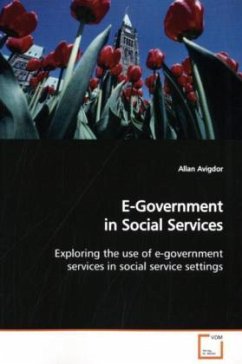E-government services are rapidly becoming a
permanent part of the governing process the world
over. These services involve the use of the latest
information and communication technologies to
facilitate and enhance access to government
information and services. E-government represents an
entirely new mode of service delivery that
promises some of the most important advances in the
area of government accessibility since the advent of
the modern welfare state. These resources have a
number of unexplored social service applications
that are examined in this book. E-government
principles and practices are reviewed at the local
and international levels, with particular attention
paid to the Government of Canada s e-government
initiative, known as Government On-Line (GOL). Seven
specific e-government applications that can benefit
the social service sector and its clients are
identified and discussed. The results of eight
interviews with directors of local agencies
regarding the future of e-government in social
services are reported and examined. Specific
recommendations and directions for future research
are provided.
permanent part of the governing process the world
over. These services involve the use of the latest
information and communication technologies to
facilitate and enhance access to government
information and services. E-government represents an
entirely new mode of service delivery that
promises some of the most important advances in the
area of government accessibility since the advent of
the modern welfare state. These resources have a
number of unexplored social service applications
that are examined in this book. E-government
principles and practices are reviewed at the local
and international levels, with particular attention
paid to the Government of Canada s e-government
initiative, known as Government On-Line (GOL). Seven
specific e-government applications that can benefit
the social service sector and its clients are
identified and discussed. The results of eight
interviews with directors of local agencies
regarding the future of e-government in social
services are reported and examined. Specific
recommendations and directions for future research
are provided.








